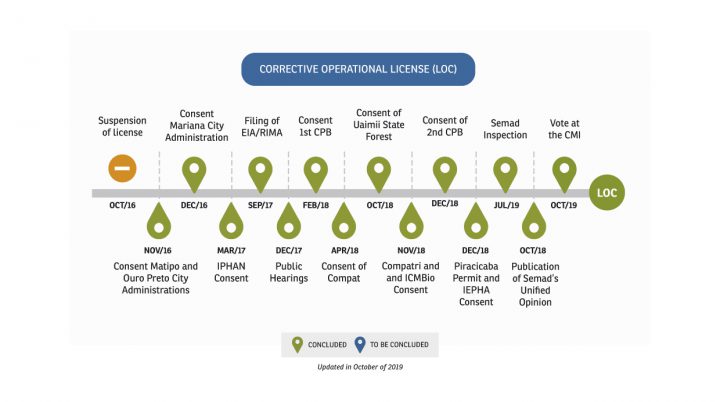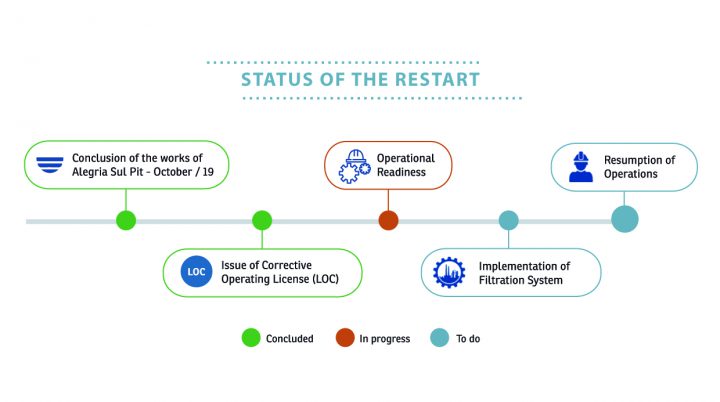Samarco
Founded in 1977, Samarco is a privately held mining company. Its main product, iron ore pellets, is being sold to the steel industry in countries of the Americas, the Middle East, Asia and Europe.
The company, 42 years active in the Brazilian mineral sector, has two operating units: Germano, in Mariana and Ouro Preto (MG), where iron ore extraction and beneficiation was carried out in three concentrators, and Ubu, in Anchieta (ES), where four pelletizing plants are located. The units are interconnected by three 400-kilometer-long pipelines, which run through 25 municipalities of the two states.
In 2015, when Samarco halted its operations, 24.9 million tons were produced, 97% in pellets and 3% in iron ore fines. That year, the company was the 12th largest exporter in Brazil, with a revenue of R$ 6.5 billion, and generated around 6 thousand direct and indirect jobs.
Throughout its history, the company has always dedicated itself to honoring its commitments to society and the environment and this conduct remains to this day. It is for this reason that the Company expresses its dismay at the collapse of the Fundao dam in November 2015.
The Fundão dam collapse
The dam collapse, on November 5, 2015, caused environmental damage, impacting families in the region and other locations along the Doce River. We sincerely apologize for the harm caused to communities and society and we know that none of our actions can bring back those who lost their lives.
From the first day after the incident, Samarco put in place actions to assist the people involved and to repair environmental damages. To prove its commitment to the social, environmental and economic recovery of the impacted regions, Samarco, together with its shareholders Vale SA and BHP Billiton Brasil Ltda., signed, in March 2016, a Transaction and Conduct Adjustment Agreement (TTAC) with the federal government and state governments of Minas Gerais and Espirito Santo. The TTAC provided for the creation of a foundation to repair and remedy the impacts of the collapse. Since August that year, the Renova Foundation has been in charge of the 42 repair and compensation programs provided for in the TTAC.
From November 2015 to August 2019, R$ 6.26 billion has been allocated to the reparation and compensation actions, which were taken over by the Renova Foundation in August 2016.
After the emergency actions, which took place throughout 2016, the company started seeking authorizations to resume its operations.
Operational resumption of Samarco
Operational restart will be gradual, without the use of a tailings containment dam, and will take place only after the implementation of a dry stacking tailings disposal and treatment system, which involves the Alegria Sul pit and filtration. Financial resources required for the construction of the filtration plant are subject to shareholder approval. The installation of the filtration system is expected to take about 12 months.
Alegria Sul Pit and the filtration system
In the pit, the company will dispose the mud, which corresponds to 20% of the waste generated at the mine. The sandy tailings, the equivalent of 80% of the total generated, will be filtered and dry stacked, which is a much safer method. The filtration process will allow for the reuse of water.
The Alegria Sul Pit, a structure resulting from the mining process, has been under construction since October 2018 and will have the capacity to receive 9.7 million cubic meters of tailings. Its use for tailings disposal avoids environmental impact in another area. It is a stable rock formation, a confined space, and therefore the structure allows natural and safer containment.
The first stage of the construction of the pit, the preparation and conformation of the space, was completed at the end of May 2019. The second stage is in progress and consists of the electromechanical assembly of the tailings and water pumping system. The works are being accompanied by an independent audit.
Corrective Operational Licensing (“LOC”)
In October 2016, the environmental licenses of the Germano Complex (MG) were suspended. In order for them become effective again and for Samarco to be able to resume its operations in the future, the company was required by the State Secretariat for Environment and Sustainable Development (SEMAD) to develop a Corrective Operating Licensing (LOC) process.
The LOC process was scheduled for a vote by the Chamber of Mining Activities (CMI) of the State Council for Environmental Policy (COPAM), at its regular meeting on October 25, when Samarco’s Corrective Operating License was approved, which has had the participation of several players, such as civil society, government authorities and regulatory bodies.
Resume Status

Coming back but different – with no tailings dam and with the adoption of new technologies that enhance safety – reinforcing Samarco’s commitment to communities and society.
See below what is pending for Samarco to resume operation and click here to learn more.




